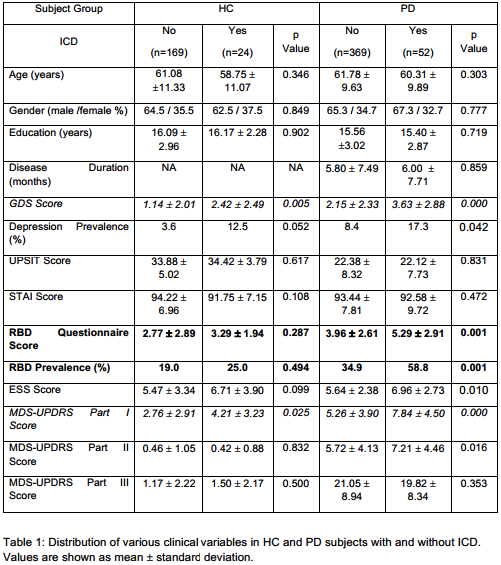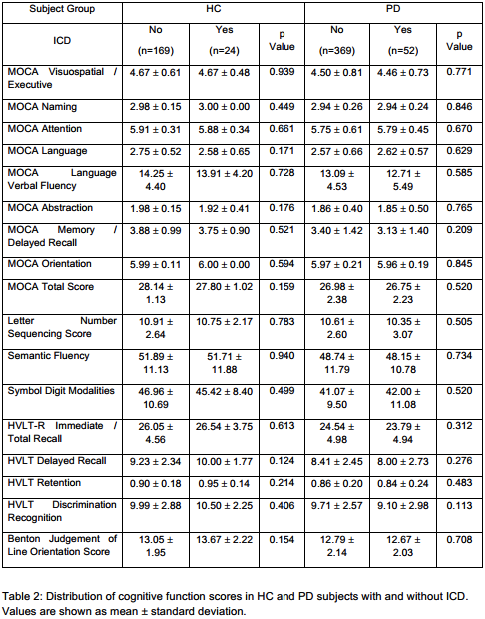Session Information
Date: Monday, June 5, 2017
Session Title: Parkinson's Disease: Non-Motor Symptoms
Session Time: 1:45pm-3:15pm
Location: Exhibit Hall C
Objective: To investigate various clinical factors associated with Impulse Control Disorders (ICD) in Parkinson’s disease (PD) patients who have never been exposed to Dopamine Replacement Therapy (DRT).
Background: DRT, particularly dopamine agonist, is a key risk factor in development of ICD in PD1. Other clinical factors, namely RBD2 and cognitive dysfunction3, have also been implicated by different studies but with conflicting results4, 5. Latter may partly be due to the confounding factor of DRT, which impacts both RBD and cognitive function, in addition to being a key risk factor of ICD. There is one small study which has attempted to study ICD in drug-naïve PD patients and reported its association only with depression6. However, there are no other data on this topic.
Methods: Baseline data of 423 PD and 196 healthy control (HC) subjects from the Parkinson’s Progression Marker Initiative (PPMI)7 was accessed as of December 1, 2016. Questionnaire for Impulsive-Compulsive Disorders in Parkinson’s Disease (QUIP)-Short Form was used to calculate the prevalence of ICD8. Statistical testing was done in SPSS 24 software using Chi-square test and student t-test. We used p value of <0.01, rather than 0.05, to test significance for minimizing impact of multiple testing in this cross-sectional analysis.
Results: The prevalence of ICD was equal at 12.4% in both HC and PD groups. RBD questionnaire score and RBD (classified based on RBD questionnaire score > 5) prevalence (table 1) were significantly higher in PD patients with ICD versus without ICD, compared to a non-significant increase in HC. Geriatric Depression Scale (GDS) score (table 1) was significantly higher for ICD subjects in both PD and HC groups. Of note, there were no significant differences in other clinical factors (table 1) and various cognitive function scores (table 2) in subjects with ICD versus without ICD in either HC or PD. MDRS-UPDRS part I score was expectedly higher in PD patients with ICD.
Conclusions: RBD is associated with ICD in drug-naïve PD patients. Although it needs to be further investigated whether RBD plays an independent role in development of ICD, present finding may guide clinicians in use of dopamine agonist for treating PD patients with pre-existing RBD symptoms or diagnosis.
Cognitive function scores of drug-naïve PD patients with ICD are similar to those without ICD.
High score on GDS is associated with ICD in both PD and HC.
References: 1. Bastiaens J, Dorfman BJ, Christos PJ, Nirenberg MJ. Prospective cohort study of impulse control disorders in Parkinson’s disease. Mov Disord 2013;28(3):327-333.
2. Fantini ML, Macedo L, Zibetti M, et al. Increased risk of impulse control symptoms in Parkinson’s disease with REM sleep behaviour disorder. J Neurol Neurosurg Psychiatry 2015;86(2):174-179.
3. Vitale C, Santangelo G, Trojano L, et al. Comparative neuropsychological profile of pathological gambling, hypersexuality, and compulsive eating in Parkinson’s disease. Mov Disord 2011;26(5):830-836.
4. Siri C, Cilia R, Reali E, et al. Long-term cognitive follow-up of Parkinson’s disease patients with impulse control disorders. Mov Disord 2015;30(5):696-704.
5. Bayard S, Dauvilliers Y, Yu H, et al. Impulse control disorder and rapid eye movement sleep behavior disorder in Parkinson’s disease. Parkinsonism Relat Disord 2014;20(12):1411-1414.
6. Antonini A, Siri C, Santangelo G, et al. Impulsivity and compulsivity in drug-naive patients with Parkinson’s disease. Mov Disord 2011;26(3):464-468.
7. Parkinson Progression Marker I. The Parkinson Progression Marker Initiative (PPMI). Prog Neurobiol 2011;95(4):629-635.
8. Weintraub D, Mamikonyan E, Papay K, Shea JA, Xie SX, Siderowf A. Questionnaire for Impulsive-Compulsive Disorders in Parkinson’s Disease-Rating Scale. Mov Disord 2012;27(2):242-247.
To cite this abstract in AMA style:
D. Gupta, M. Marano, S. Fahn. Impulse control disorder and associated clinical factors in drug-naïve Parkinson’s disease. [abstract]. Mov Disord. 2017; 32 (suppl 2). https://www.mdsabstracts.org/abstract/impulse-control-disorder-and-associated-clinical-factors-in-drug-naive-parkinsons-disease/. Accessed December 24, 2025.« Back to 2017 International Congress
MDS Abstracts - https://www.mdsabstracts.org/abstract/impulse-control-disorder-and-associated-clinical-factors-in-drug-naive-parkinsons-disease/


